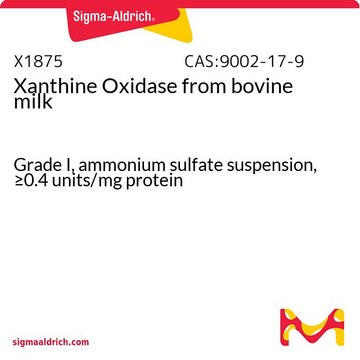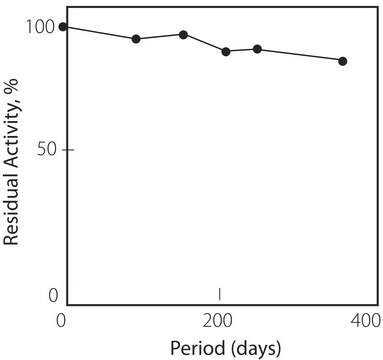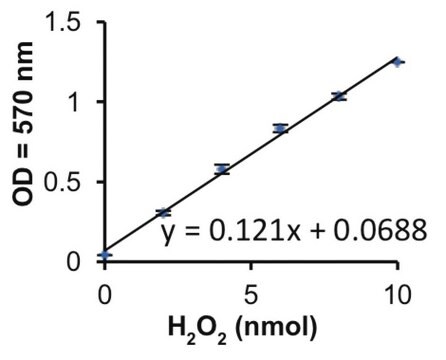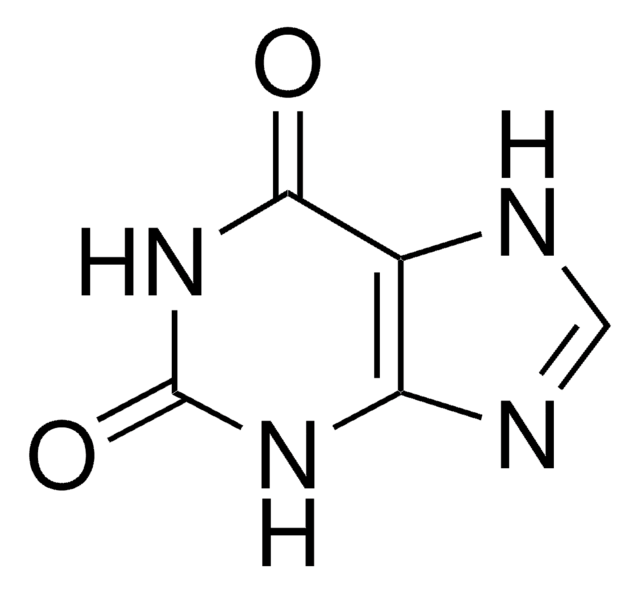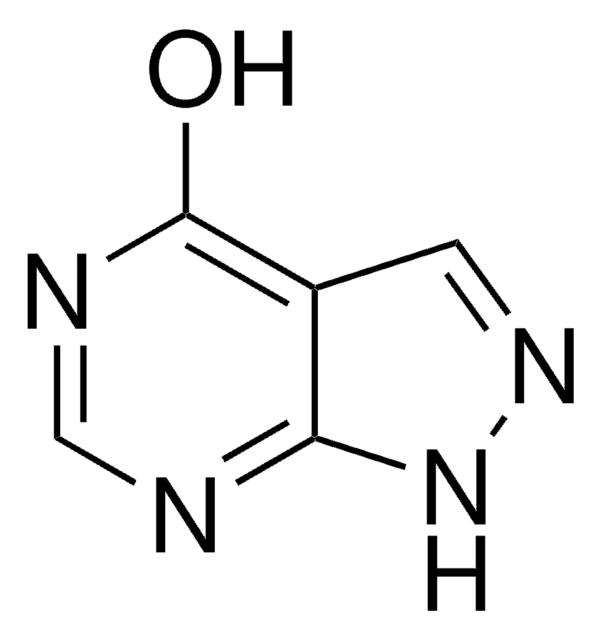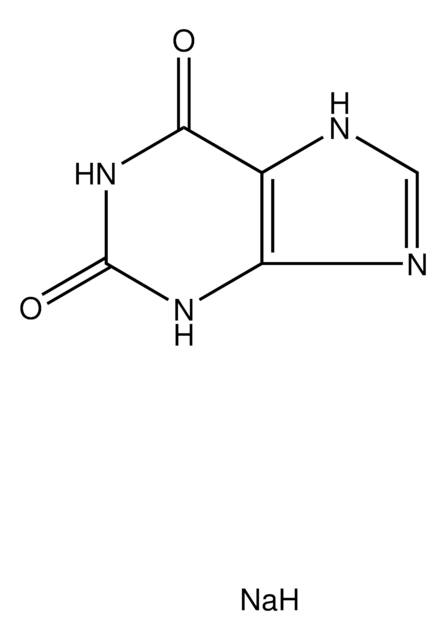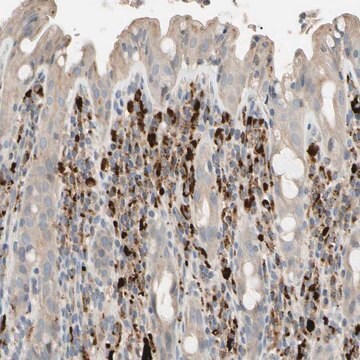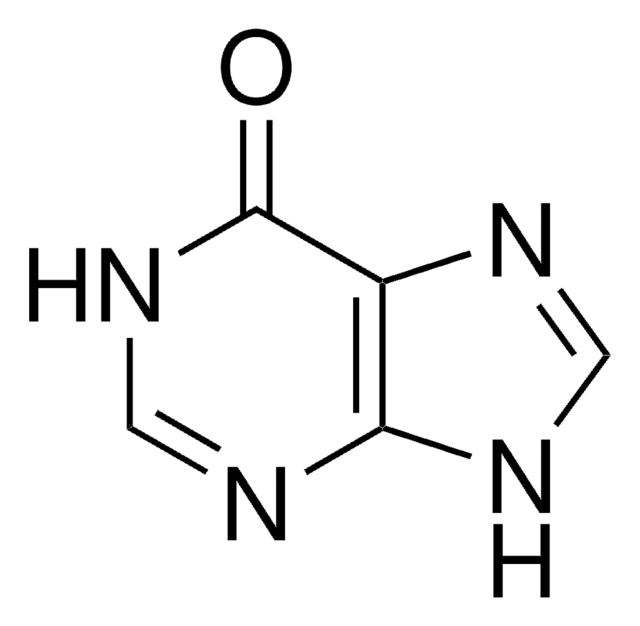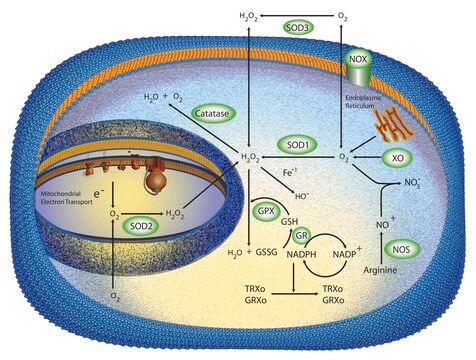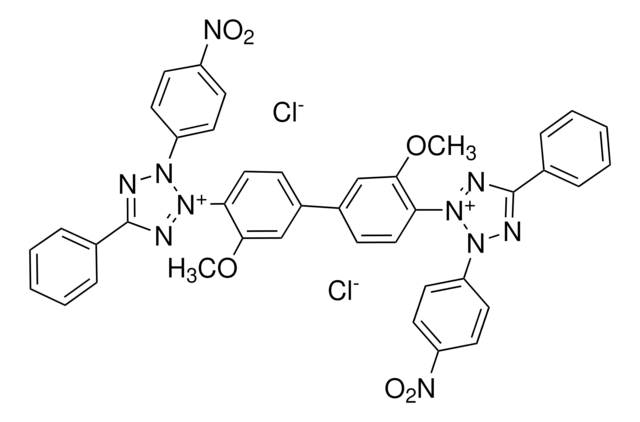X4376
Xanthine Oxidase from bovine milk
lyophilized powder, 0.4-1.0 units/mg protein
Synonyme(s) :
XOD, Xanthine:oxygen oxidoreductase
Se connecterpour consulter vos tarifs contractuels et ceux de votre entreprise/organisme
About This Item
Numéro CAS:
Numéro de classification (Commission des enzymes):
1.17.3.2.
Numéro CE :
Numéro MDL:
Code UNSPSC :
12352204
Nomenclature NACRES :
NA.54
Produits recommandés
Source biologique
bovine milk
Forme
lyophilized powder
Activité spécifique
0.4-1.0 units/mg protein
Poids mol.
283 kDa
Composition
Protein, 10.0-25.0%
Température de stockage
2-8°C
Vous recherchez des produits similaires ? Visite Guide de comparaison des produits
Description générale
enthält auch proteolytische Aktivität
Application
Xanthine Oxidase from bovine milk has been used as a source for superoxide generation. It has also been used as a model enzyme in the internally calibrated electrochemical continuous enzyme assay (ICECEA).
Actions biochimiques/physiologiques
The isoflavanoid genistein was shown to inhibit xanthine oxidase at concentrations between 0.1-4.0 μM and then activate xanthine oxidase at concentrations higher than 5 μM.
Xanthine Oxidase acts as a potential biomarker for oxidative stress. It is also implicated in tissue and vascular injuries such as liver damage, inflammatory diseases and chronic heart failure.
Xanthine oxidase is a molybdenum-containing enzyme that is found in the cytosol, and may be strongly inhibited by flavonoids. It plays a vital role in the metabolism of some drugs, as well as purines and pyrimidines. It is also known to be a biological source of reactive oxygen species.
Définition de l'unité
One unit will convert 1.0 μmole of xanthine to uric acid per min at pH 7.5 at 25 °C. Approx. 50% of the activity is obtained with hypoxanthine as substrate.
Forme physique
Contains 0.5% sodium salicylate.
Remarque sur l'analyse
Protein determined by biuret
Mention d'avertissement
Danger
Mentions de danger
Conseils de prudence
Classification des risques
Resp. Sens. 1
Code de la classe de stockage
11 - Combustible Solids
Classe de danger pour l'eau (WGK)
WGK 3
Point d'éclair (°F)
Not applicable
Point d'éclair (°C)
Not applicable
Équipement de protection individuelle
Eyeshields, Gloves, type N95 (US)
Faites votre choix parmi les versions les plus récentes :
Déjà en possession de ce produit ?
Retrouvez la documentation relative aux produits que vous avez récemment achetés dans la Bibliothèque de documents.
Les clients ont également consulté
Genistein effect on xanthine oxidase activity.
Sumbayev VV.
Food And Chemical Toxicology, 73, 39-43 (2001)
Resistance of postharvest biocontrol yeasts to oxidative stress: a possible new mechanism of action
Castoria R, et al.
Phytopathology, 93(5), 564-572 (2003)
Kathrin S Zeller et al.
PloS one, 8(5), e64897-e64897 (2013-06-06)
Cells are exposed to several types of integrin stimuli, which generate responses generally referred to as "integrin signals", but the specific responses to different integrin stimuli are poorly defined. In this study, signals induced by integrin ligation during cell attachment
Massimiliano Magro et al.
Materials (Basel, Switzerland), 13(7) (2020-04-16)
Generally, enzyme immobilization on nanoparticles leads to nano-conjugates presenting partially preserved, or even absent, biological properties. Notwithstanding, recent research demonstrated that the coupling to nanomaterials can improve the activity of immobilized enzymes. Herein, xanthine oxidase (XO) was immobilized by self-assembly
Rapid electrochemical enzyme assay with enzyme-free calibration
Zhang M, et al.
Analytical Chemistry, 85(12), 6026-6032 (2013)
Notre équipe de scientifiques dispose d'une expérience dans tous les secteurs de la recherche, notamment en sciences de la vie, science des matériaux, synthèse chimique, chromatographie, analyse et dans de nombreux autres domaines..
Contacter notre Service technique